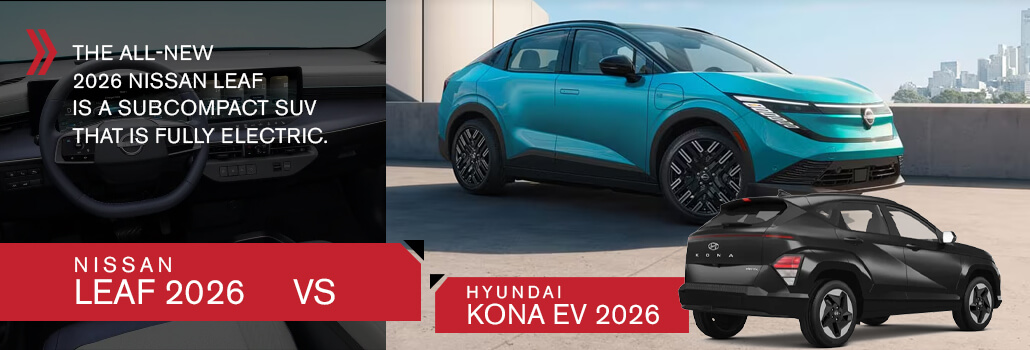New: 1-833-691-9150
Used: 1-855-594-7682
Service & Parts: 450-691-9541

In this comparison between the 2026 Nissan Leaf and the 2026 Hyundai Kona EV, we start with what you feel at every green light: throttle response and the smoothness of the single-speed transmission. The 2026 Nissan Leaf keeps a front-wheel-drive layout and the EV-typical single gear, but turns up the fun with 214 hp and 261 lb-ft of torque. In practice, that means brisk passing and reassuring traction, even when the pavement gets cold. The 2026 Hyundai Kona EV, also front-wheel drive with a single-speed reducer, delivers a supple, well-tempered drive. Both will please commuters, but the Leaf’s pedal calibration emphasizes linearity and confidence—a real advantage day to day in urban driving and across Montréal’s South Shore. The best way to judge it is still behind the wheel: book your test drive and compare the real-world feel at Solution Nissan. The Leaf’s key figures (214 hp, 261 lb-ft, 150 kW DC fast charge capability, 7.2 kW onboard charger) are confirmed by Canadian-market specifications.
Range and charging shape the EV experience, especially in Quebec’s climate. The 2026 Nissan Leaf claims up to 488 km of estimated range (75 kWh battery), with deliverable DC fast charging up to 150 kW and NACS compatibility for access to the Supercharger network—perfect for weekend getaways as well as school-and-work runs. The 2026 Hyundai Kona EV remains a strong benchmark with roughly 420 km of range based on Canadian data, which is plenty for most daily routes. In both cases, home charging is the most convenient solution; on the Leaf side, the 7.2 kW onboard charger optimizes overnight sessions on a 240 V Level-2 station. If you have questions about installing a charger or upgrading your electrical panel, our team can guide you from A to Z and help optimize your operating costs. Contact us for a personalized analysis of your routes and habits.

The new 2026 Nissan Leaf updates the cabin with a clean layout that makes life easier. It offers a “cinematic” display area of more than 28 inches in total thanks to large, side-by-side screens, providing crisp readouts for driving info and navigation. Upper trims add a premium Bose audio system with 10 speakers to turn commutes into mini concerts, plus a comprehensive driver-assist suite (ProPILOT Assist, Blind Spot Warning, 3D camera). The 2026 Hyundai Kona EV answers with a well-equipped tech package and a modern dual-screen setup. In everyday use, the Leaf leans on intuitive menus and seamless Google integration to minimize distraction—a genuine plus for families. Drop by to explore the ergonomics, rear-seat space, and cargo volume that matter day to day, then discover colours and incoming units in inventory.

When it comes to versions, the 2026 Nissan Leaf brings a clear lineup tailored to local needs. The Leaf S+ 75 kWh posts a fuel-equivalent consumption of 1.8 Le/100 km in the city (and 2.1 on the highway, gasoline equivalents per EPA), while offering Plug & Charge compatibility for even simpler stops. For audiophiles, the Platinum+ version caps the experience with the Bose system and a rich features set. The 2026 Hyundai Kona EV also offers several trims and, depending on market/version, an 11 kW AC charger—handy if you have a 48 A circuit at home or work. At Solution Nissan, we take time to model your real-world scenario (mileage, charger, charge time, climate) to build a precise budget. Start online with our financing, then compare vehicles in inventory before booking a test drive.
| Criterion | Nissan Leaf 2026 | Hyundai Kona EV 2026 |
| Architecture & transmission | Front-wheel drive, single-speed | Front-wheel drive, single-speed |
| Power / Torque | 214 hp / 261 lb-ft | ~201 hp / 188 lb-ft (per Canadian versions) |
| Main battery | 75 kWh (53 kWh to come depending on versions) | 64.8 kWh (Canada market) |
| Stated range | Up to 488 km (est. EPA) | About 420 km (Canada data) |
| DC fast charging | Up to 150 kW, Plug & Charge, NACS | Up to 100–102 kW by version, NACS (North America adoption) |
| Onboard AC charging | 7.2 kW | 11 kW (by Canada versions) |
| Displays / screens | >28 in combined (dual large screens) | Dual large screens (by version) |
| Premium audio | Bose 10 speakers (by version) | Bose system available (by version) |
| Fuel-equiv. cons. (S+) | City: 1.8 Le/100 km | City: 1.8 Le/100 km |
| Driver assists | ProPILOT Assist, 3D camera, etc. | Hyundai SmartSense advanced assists |
| Manufacturing location | Built in Japan (for Canada) | South Korea |

Putting the 2026 Nissan Leaf and 2026 Hyundai Kona EV side by side reveals two compelling choices, but the Leaf takes the lead for typical Quebec use. Its up-to-488-km range, deliverable NACS fast charging, 261 lb-ft of torque, and 7.2 kW onboard charger make it a dependable, economical, and easygoing companion. Add a modern cabin with more than 28 inches of combined display area and an available Bose 10-speaker system, and you get an EV tailored to young families and active adults looking for a friction-free experience. One last noteworthy point: the Leaf destined for Canada is built in Japan, a sign of a proven production lineage.
Ready to move from comparison to a real-world drive? Explore configurations, colours, and incoming units in inventory, check out our 2026 Nissan Leaf model page, start a financing request in minutes, then book your test drive at Solution Nissan in Châteauguay. For any questions (home charger, winter tires, delivery timing), our team replies quickly via our contact page.
Please select a department to continue your conversation.
Ventes